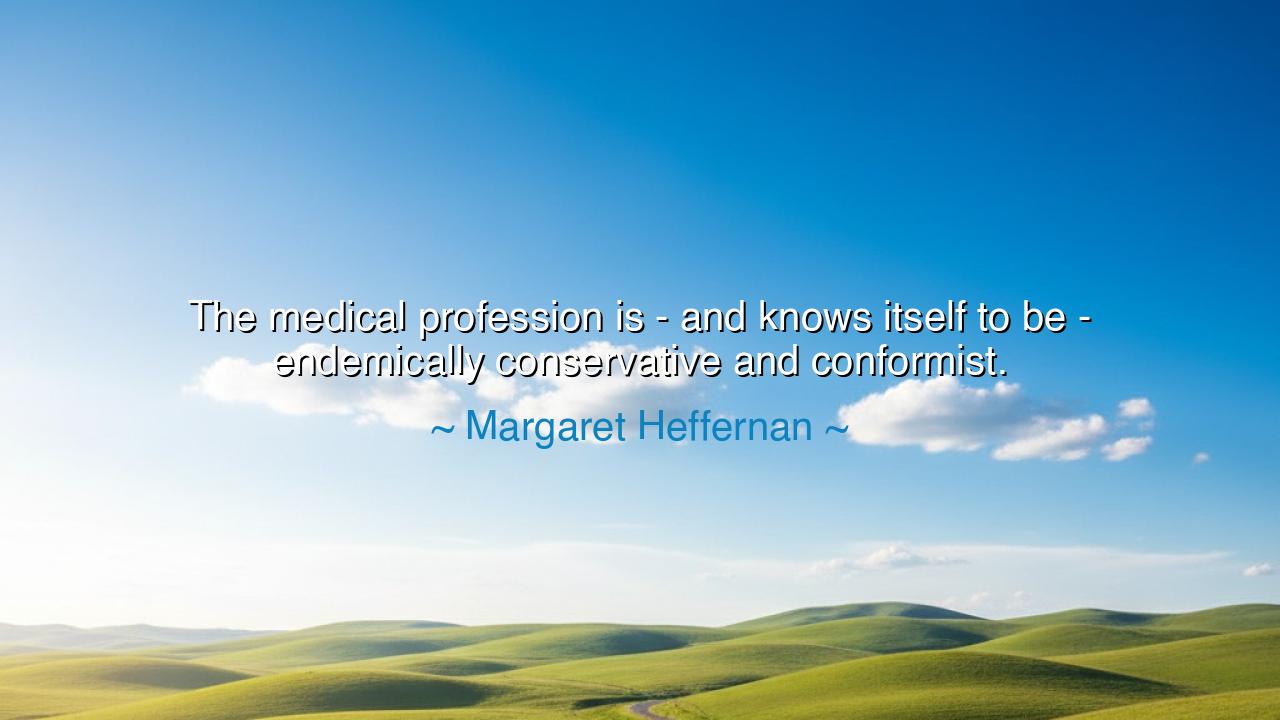
The medical profession is - and knows itself to be - endemically
The medical profession is - and knows itself to be - endemically conservative and conformist.






The words of Margaret Heffernan—“The medical profession is – and knows itself to be – endemically conservative and conformist”—cut through the veil of pride that often surrounds human institutions. Her words are not an accusation born of malice, but a truth spoken with the clarity of observation and the courage of conscience. Beneath them lies an insight as old as civilization itself: that those who wield the power to heal must guard themselves not only against disease, but against the complacency of tradition. For even the noblest institutions, when too cautious or too reverent of their own authority, can become prisons for progress.
Heffernan, a thinker of uncommon courage and intellect, has long studied the patterns of human behavior that stifle innovation. In this statement, she casts her gaze upon the world of medicine—one of humanity’s most revered callings—and reveals a paradox. The medical profession exists to save life, yet it often resists the very changes that could save more lives. Its conservatism is not evil, but habitual, born from the weight of responsibility and the fear of error. Doctors are trained to be cautious, for every decision carries the gravity of human suffering. Yet that same caution, when hardened into conformity, can blind the healer to new truths. The physician, meant to be a pioneer, becomes instead a guardian of the status quo.
History offers many examples of this tragic tension between innovation and conformity. In the 19th century, a Hungarian physician named Ignaz Semmelweis discovered that simple handwashing could save mothers from dying of childbed fever. His evidence was undeniable, yet his peers mocked and rejected him. Why? Because his findings challenged the established dogma of the time—that disease arose from bad air, not from unseen germs. The doctors of his era preferred their certainty to his truth. Semmelweis died disgraced, yet history later vindicated him. His fate stands as a warning to every profession: that when pride and conformity silence discovery, the cost is not just progress—it is life itself.
Heffernan’s insight is not meant to shame the medical field, but to awaken it. She reminds us that conservatism, though sometimes a shield of safety, can also be a chain that binds the spirit of inquiry. Medicine, like all human knowledge, advances not through obedience, but through questioning. Every great medical breakthrough—anesthesia, vaccination, antibiotics, organ transplantation—was first greeted with skepticism or fear. The very nature of discovery requires rebellion against convention. But rebellion must be guided by wisdom, not vanity. The balance between caution and courage is the eternal challenge of the healer.
In this, Heffernan’s words speak beyond medicine; they touch the heart of all human endeavor. Whether in science, art, or governance, conformity breeds stagnation. It lulls the mind into comfort and the heart into complacency. The true innovator, the true servant of humanity, must have the audacity to ask, “What if we are wrong?” For progress does not come from those who worship tradition, but from those who question it with respect and humility. The great teachers of old—from Galileo to Darwin to Curie—were each resisted by their peers, yet each expanded the horizon of knowledge because they refused to bow to conformity.
There is also deep compassion in Heffernan’s critique. She understands that the conservatism of medicine arises not from cruelty, but from fear—the fear of harm, the fear of failure, the fear of blame. To break from established methods feels perilous when lives hang in the balance. Yet she urges us to see that courage and compassion must coexist. A doctor who refuses to learn for fear of error commits a graver sin: the sin of inaction. As the ancients taught, the physician’s oath is not merely to avoid harm, but to pursue the greater good. And sometimes that pursuit demands the bravery to challenge what “everyone knows.”
The lesson of Margaret Heffernan’s words, then, is one of vigilance and humility. To those who heal, she says: remember that reverence for tradition must never eclipse the hunger for truth. Question what you inherit. Listen to dissenting voices, for wisdom often wears the disguise of rebellion. Let your caution protect life, but let your curiosity improve it. For medicine is not a monument to what has been achieved—it is a living art that must evolve with every generation.
So, my child, when you walk the halls of learning or practice the art of healing, carry Heffernan’s wisdom in your heart. Respect your teachers, but never worship their certainty. Honor tradition, but do not be imprisoned by it. The world’s progress depends on those who, in moments of doubt, dare to ask the forbidden question—and who, in doing so, transform fear into knowledge, and conformity into courage. For in every age, it is the brave questioning mind that keeps the lamp of truth burning bright, even when the winds of tradition threaten to extinguish it.






AAdministratorAdministrator
Welcome, honored guests. Please leave a comment, we will respond soon